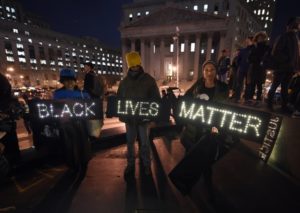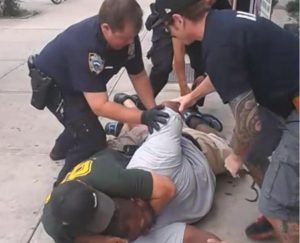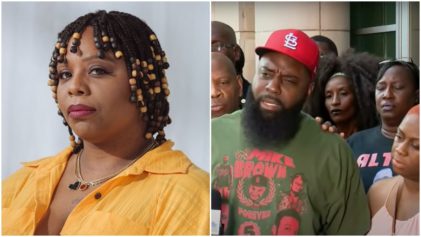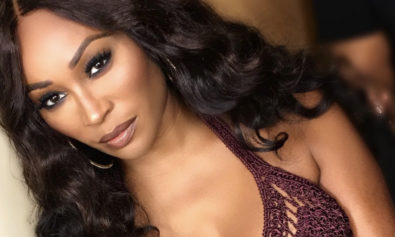
Only one of those descriptions would apply to Josh Jelks, the co-founder and CEO of GAFollowers, but as a young Black man in a country that falsely claims to be post-racial, he doesn’t believe a white police officer would even take the time to figure out which one it is.
“It’s like we’re all f***ing animals,” Jelks said, clearly frustrated with the heart-breaking realities of a modern day society that still requires crowds of protesters to remind the nation of something that should be “self-evident,” as New York City Mayor Bill de Blasio pointed out —“Black Lives Matter.”
All across the globe the phrase has been scribbled, painted and etched onto signs that were held firmly in the hands of protesters who have grown weary of being treated like practice targets for police officers.
“There is just no value,” Jelks added. “I don’t care what anybody says, they don’t care. They don’t give a damn about a Black man.”
The discussion isn’t new. Racism still plagues the so-called land of the free and home of the brave.
The grim reality of the situation, however, has reached a new level.
“Worthless,” “garbage,” “useless” and “broken,” were the only kinds of words young Black men from around the nation could find to describe how they felt they were being perceived after grand juries failed to indict Ferguson, Missouri, police officer Darren Wilson in the death of unarmed 18-year-old Michael Brown and New York City police officer Daniel Pantaleo in the death of unarmed Staten Island father Eric Garner.
“When I first saw the video, when they first posted it, I was like, ‘If this isn’t murder caught on camera I don’t know what is,’” Jelks said as he recalled the first time he laid eyes on the video of Pantaleo placing Garner in a chokehold.

He recalled the first few times he traveled to Athens, Georgia, for business purposes and how it seemed like strangers and law enforcement saw nothing more than a tall, Black man with tattoos.
“I’m pretty stocky to be a 6-foot dude and I have tattoos and one of the most uncomfortable feelings I ever had was going through Athens one day and I had my tattoos exposed,” Jelks said. “People were just looking at me like I was a hoodlum, like I was going to steal a purse or something like that.”
The young entrepreneur explained that Athens had a negative connotation with him for quite some time, but now it seems those same glares and lack of respect for a Black man can be felt well beyond the city limits of Athens—it’s all across the nation.
“You can have your hands up, you can be in handcuffs, you can be holding a box of chocolates, you can sneeze – it just doesn’t matter,” said Tomorias Brown, a 23-year-old dance instructor who recently moved to Tampa, Florida. “If you’re Black it’s scary enough to give these officers the right to kill you. You’re Black therefore you are frightening. You are Black and therefore nobody cares if you are left dead in the street for four hours.”
Brown went on to say that the latest grand jury decisions have made everything his mother worked hard for “null and void.”
Staining the Crowns of Kings with Cold Blood
“In two weeks, just two weeks, they have made my mother’s hard work null and void,” Brown said. “You know why? She did everything she could to raise me to be a decent, respectable young man. The type of man that can be successful. The type of man that respects the law. The type of man that has a good head on his shoulders. She raised me right. None of that matters now. I could die tomorrow because the one thing my mother couldn’t do was protect me from a racist coward with a gun.”
“My TV was just stuck on this sick and twisted show about why it’s okay to kill Black men—because we’re thugs and we’re dangerous and we’re this and we’re that. Just shoot us already. Don’t even learn our name!”
Brown went on to say that what he saw in the news was the justification of killing Black men.
“It wasn’t even like I was watching news anymore, you know,” Brown added. “My TV was just stuck on this sick and twisted show about why it’s okay to kill Black men—because we’re thugs and we’re dangerous and we’re this and we’re that. Just shoot us already. Don’t even learn our name! That much doesn’t matter. What matters is that I’m a young king with beautiful brown skin and you want to tarnish that with blood.”
A “young king.” That’s what Brown said every Black man is and what every Black man should feel like. Instead, they are treated like livestock who aren’t even worthy of protecting from poachers.

Bradley found it difficult to even return to work after the grand jury decisions were announced and he even decided to get away for a while rather than returning to an office where he would have to bite his tongue in the midst of tragedy.
“I’ll be honest,” Bradley said. “I haven’t gone to work since Monday when the decision in Ferguson came out. I don’t feel comfortable being around people right now, especially of a different color. It’s a weird place for me in America.”
Williams went on to say that he is from a “largely white neighborhood in Maryland” but that he is a “very proud Black man” and for that reason he just couldn’t return to his office just yet.
“I almost have to marginalize myself [at work] and seem less proud to avoid stepping on toes,” he added. “That weakness, the one that demands I lower myself, is one I can’t deal with right now—too pivotal of a time for myself and others who look like me.”
The Burden of Keeping Mothers Awake At Night
For one Georgia mother, who opted to remain anonymous, the world seems all that much scarier for her son who suffers from bi-polar disorder.
“All these white murderers sit in court with an expensive lawyer who will argue that they are mentally ill and that’s why they shouldn’t be punished,” she said. “But my son? My son won’t get such a luxury. The same excuse that will get a white murderer special treatment will be the same reason they gun my son down and the best I can hope for is that he will be a [hashtag] on Twitter? Why? Because a man with a gun was somehow afraid of him? Because the officer didn’t consider that my son was just as terrified of him as he was of my son—and only one of them have the right to even be afraid!”
She went on to say that her son has “bad days” and “some good days” but that one “bad day” struggling with a disorder that isn’t his fault could be the day he doesn’t come home.
“He can be a few minutes late coming home from work and I cry,” she said. “And my phone will ring and I’ll lose my breath because I think this is the call. This is it. They took him from me.”
Dear Officer, You Have Not Killed A Monster
Despite spending their lives battling injustice and struggling to see their lives valued in a nation that swears to be fair and full of opportunity for all people, somehow these young men failed to be vengeful or filled with malice.
Instead, all of the men expressed clear messages of love and forgiveness.
“If I was ever laying in a pool of my own blood because an officer shot me, I would find the strength to look him dead in the eye and tell him, ‘I love you and I forgive you,’ “ Brown said. “And I would absolutely mean it and he will have to know that he killed someone who was much stronger and kinder than he will ever hope to be in his wildest dreams…. regardless of what a grand jury decides he will be forced to recognize that he didn’t kill a monster.”
Jelks shared the same message of forgiveness even in the midst of his frustrations and the deep concern he has for his young nephews.
“What’s terrifying to me right now is that while this is happening, I have three nephews and they have to grow up in this world looking at this stuff and how Black men’s lives have been devalued to the point of a joke,” Jelks said. “I was playing with my nephews and I almost cried when I saw the Michael Brown thing and I just thought that could be any one of my nephews.”
To prepare them for the world they are about to face, however, Jelks said he focused on just teaching them the value and impact of love.
“I just tell them to get to know people and love them if they are a good person,” he said. “Don’t do what they’re doing. Don’t see someone’s skin—or even their badge, you know, if it’s a police officer—and decide you hate them or you’re afraid of them or whatever. Judge them based on their personality and their character.”
Perhaps if more officers had the same thought process, the blood of Black men wouldn’t be spilling all across the nation. Protesters wouldn’t need to remind anyone that “Black lives matter.” And “I can’t breathe” would have never been such a prevalent and important slogan for those who feel suffocated by a system that seems to be efficient only at putting Black men behind bars or beneath a tombstone.


